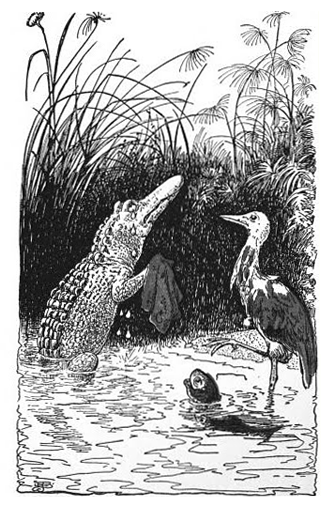The Considerate Crocodile
By Amos R. Wells
Annotations by Mary Miller

(Boston: The Christian Endeavor World, 1921), 94. Public domain.
There once was a considerate crocodile
Who lay on the banks of the river Nile,
And he swallowed a fish with a face of woe,
While his tears ran fast to the stream below.
“I am mourning,” said he, “the untimely fate
Of the dear little fish that I just now ate!” [1]
Wells, Amos R. “The Considerate Crocodile,” In The Collected Poems of Amos R. Wells, 94. Boston: The Christian Endeavor World, 1921.
[1] This poem explains the expression “crocodile tears,” meaning insincere sorrow or regret.
Contexts
Moral lessons are a common component of children’s literature. This poem is no exception. The author was a prolific Christian writer of works for adults and children. In 1921 he published The Collected Poems of Amos R. Wells under the imprint of the Christian Endeavor World, a magazine he edited. His works include books dealing with young people’s work, religious education, juvenile fiction, poetry, and devotional literature. The Christian perspective is pervasive and significant in much of the Western world. Listening to the stories and traditions of other religions, including indigenous faiths, will add depth to the conversation on the connection between ethics and environmental sustainability.
Resources for Further Study
- Listen to Lisa Yannucci reading The Considerate Crocodile.
- Read other poems by Amos R. Wells.
- Learn more about the life and work of Amos R. Wells.
Contemporary Connections
Hypocrisy is alive and well in today’s society. This poem provides a humorous way to broach the topic with young people. This delightful poem can serve as a springboard to teach students about hypocrisy and how sincerity relates to ethics. Teachers could ask children to first interpret the poem and then share other examples of this kind of behavior and to explain why it is not good.
Lessons in morality and ethics can help teach children how to respond in a meaningful way to such problems as climate change. Climate change is a global concern, and therefore students must develop empathy for people who live in distant lands, such as Zimbabwe, whose lives are very different from their own. Anna Chitando’s article African Children’s Literature, Spirituality, and Climate Change examines the relevance of African children’s literature in contributing to the response to climate change and how traditional African folklore and children’s literature can teach children to respect the environment. Chitando observes that the global South, greatly impacted by climate change but poorly equipped to respond to the global North, is sounding the alarm. Two stories from the book Stories from a Shona Childhood by Charles Mungoshi, a leading Zimbabwean author, are featured in the article.
Mungoshi’s “The Slave Who Became Chief” portrays the importance of understanding indigenous approaches to the environment and emphasizes the importance of African spirituality in the face of climate change. In the story, a slave boy, Kakore, is able to save the kingdom from drought by praying for rain. The “Spirit of the Ashpit” is about a family living in a time of drought. The father is greedy and selfish; he pretends to care for his family but looks after only himself. The mother, Madiro, is an independent woman who takes matters into her own hands by praying to her female ancestors for help, despite a taboo against doing so as a woman. Madiro shows African women overcoming traditional African patriarchal constraints.